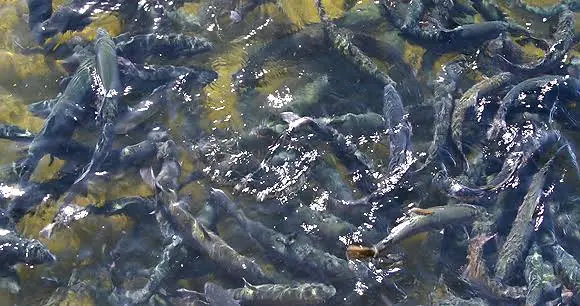BREAKING: How Fish Farming Creates Economic Opportunities – Joan

A business entrepreneur and managing director of Hiba Ventures with the brand name – Hiba Foods, Joan Eichie Daniels, has highlighted the potential of fish farming to generate job opportunities and boost local economies through increased food production.
“Nigeria is one of the countries blessed with abundant natural resources, which, if properly harnessed, could create massive job opportunities and enhance local production,” she said.
Explaining her journey into aquaculture, she said, “I decided to venture into catfish farming. Although we also operate a poultry business focused on broilers and layers, today I want to talk about catfish.”
Joan recounted how her journey began unexpectedly. “I was returning from work one day when I noticed a sign advertising fish tanks for sale. I became curious, researched, and discovered the opportunities in catfish farming. I contacted the seller, saw the tanks, bought a few, and started on a very small scale. Today, we operate on about ten plots of land.”
She admitted that the journey wasn’t easy at first. “It wasn’t just smooth sailing. I bought about 100 fingerlings and got training from the woman I bought the tanks from, but the first attempt didn’t yield much. I took a short break, came back stronger, stocked about 8,000 fingerlings, and they did well. That was when I made my first sale.”
She went further, “I rented a plot of land, built four block ponds and five earthen ponds, from there I never looked back. I became so passionate that even after work, I would head straight to the farm to watch the fish grow. It’s fascinating to see their daily progress.”
She described how strong market demand has made sales easy.
“In our local market, it’s easy to get buyers. They come directly to the farm, and within hours, the fish were sold out.”
Joan emphasised the economic potential of fish farming in Nigeria.
“Fish farming has massive potential. It can create millions of jobs for Nigerian youths, but they need to develop a passion for farming to truly succeed.”
She acknowledged that there are other types of fish farming, like tilapia, but catfish remains the most commercially viable. “Unlike tilapia, which takes longer to mature, catfish can reach market size within three to four months with good water and feed management.”
She advised unemployed graduates, “If you have a passion for farming, go into catfish farming. Success in any venture begins with interest. If you’re only in it for the money, you may give up when challenges come.”
She stressed the importance of resilience. “When you’re passionate, even if you fail the first time, you’ll try again. You learn as you go. Training is available and affordable. I’ve trained many youths who are now successful catfish farmers.”
According to Joan, water management is the key to success. “There’s no rocket science in catfish farming. If you manage your water well and use good breeds and feed, you’ll succeed.”
She noted that fish farming offers better returns than many other forms of agriculture. “This business of raising and selling mature fish offers strong returns on investment,” she said.
“Nigerian catfish farmers are now targeting export markets. Exporting well-processed, dried catfish to international standards can bring in foreign currency. Any business you dedicate yourself to can grow.
“By going into catfish farming, you’re not just creating employment. You eventually employ others, helping to reduce unemployment and feed the nation. Nigeria still imports a lot of frozen and dried fish. Local production can change that,” she added.
She believes Nigeria can compete globally in the fish farming industry, but noted funding as a significant barrier.
“The biggest challenge is access to finance. Feed costs are high. For instance, raising 1,000 fingerlings to table size can cost over N3,000,000. Many people want to start, but they lack funding.”
She noted that despite having associations of catfish farmers across states, many still struggle.
“Interestingly, buyers come from Cameroon and other African countries to purchase fingerlings and juveniles from Nigeria. This proves there’s demand beyond our borders.”
She called for greater government support to help local farmers meet export standards.
“If the government supports fish farmers with funding and enables direct exports, it will increase legal foreign exchange inflows and boost the economy.”
Joan highlighted other challenges outside farmers’ control. “Beyond personal skills like water, feed, and staff management, farmers also face infrastructure problems. For example, electricity is essential. A constant power supply reduces costs, especially when pumping water.”
She said consistent electricity, favourable policies, and better access to finance could transform the industry. “With government support, the fish farming industry can thrive. It’s lucrative, interesting, and could absorb many unemployed youths. You don’t need to start big. You can begin with tarpaulin ponds and scale up.”
She concluded, “There’s a market for catfish. It’s healthy, the demand is there, and with regular water changes and care, your fish will grow. Fish farming has what it takes to contribute significantly to Nigeria’s economic growth.”
